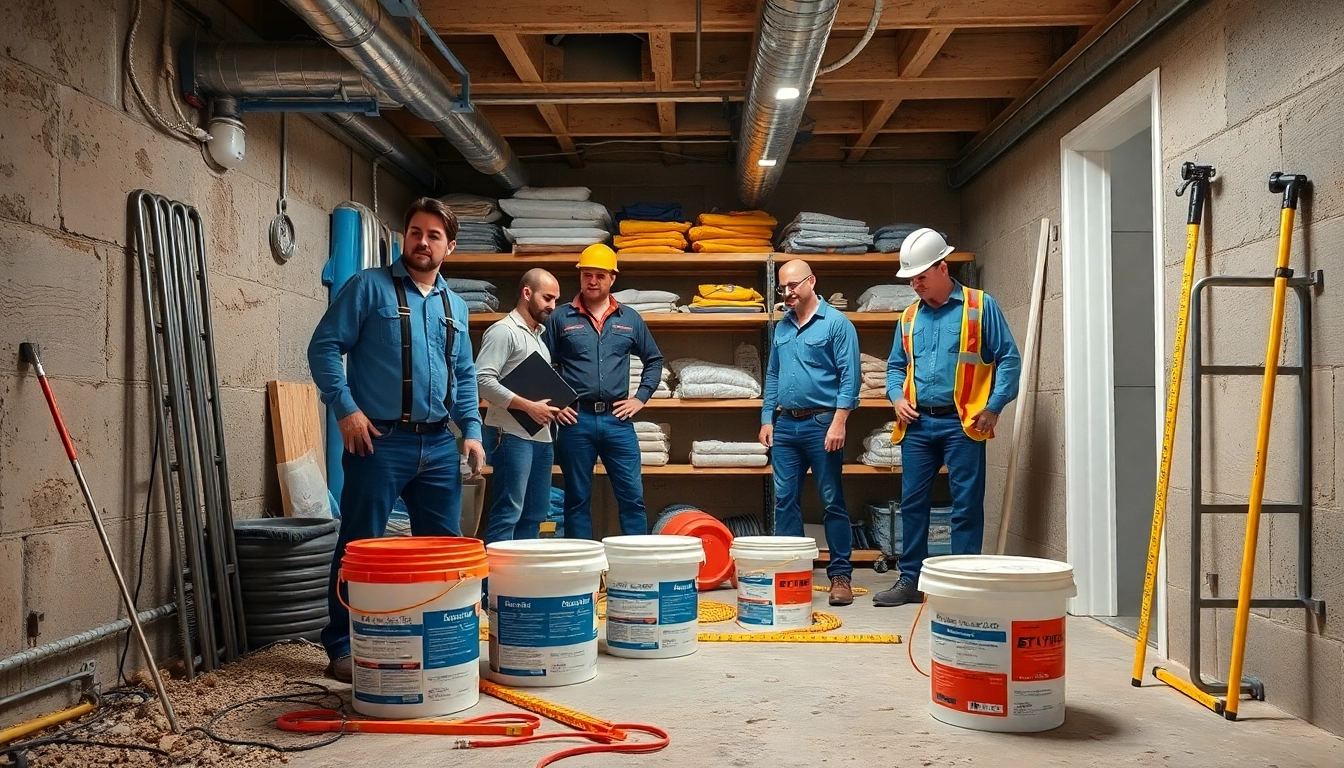
Understanding Basement Sealing
What is Basement Sealing?
Basement sealing is a crucial preventive measure designed to protect your home from unwanted moisture and related issues. This process involves applying specialized sealants or barriers to the basement walls and floors, effectively preventing water ingress. Without proper sealing, basements can become breeding grounds for mold, mildew, and structural damage due to water exposure.
Importance of Professional Basement Sealing
While some homeowners may consider tackling basement sealing as a DIY project, hiring a professional sealing company has significant benefits. Experienced professionals bring expertise in assessments, recommend the best sealing solutions tailored to your specific needs, and ensure that the installation is done correctly. This not only enhances the effectiveness of the sealing but also guarantees that the work is compliant with local building codes. Opting for a basement sealing company near me geneva will further ensure that your home is safeguarded against water damage properly.
Common Basement Issues Addressed by Sealing
Basement sealing addresses several common problems:
- Moisture Control: Excess moisture can lead to various issues, including mold and mildew.
- Flooding: Unsealed basements are highly susceptible to flooding during heavy rains or snowmelt.
- Structural Damage: Water intrusion can compromise the integrity of the foundation walls.
- Pest Infestation: Damp environments attract pests, which can cause further home damage.
Key Benefits of Hiring a Basement Sealing Company near Me Geneva
Long-term Protection Against Water Damage
One of the standout benefits of engaging a professional basement sealing company is the long-term protection it offers. By thoroughly sealing your basement, you reduce the risk of future leaks and extensive water damage. This proactive approach can prevent expensive repairs down the line while safeguarding your property investment.
Enhanced Air Quality and Indoor Environment
Moist basements often result in poor indoor air quality which can affect overall health. Professional sealing reduces humidity and dampness, which are known to contribute to respiratory issues and allergies. By creating a sealed environment, you not only improve air quality but also create a healthier living space for you and your family.
Increased Property Value and Market Appeal
Basements that are prone to flooding and water damage can severely affect property value. By ensuring your basement is properly sealed, you enhance your home’s marketability. Potential buyers are more inclined to invest in properties with dry, well-maintained basements, giving your home a competitive edge in the real estate market.
Choosing the Right Basement Sealing Company near Me Geneva
Factors to Consider When Selecting a Company
When searching for a basement sealing company, several key factors should be prioritized:
- Experience: Look for companies with a proven track record in basement sealing and waterproofing.
- Certifications: Ensure the company has relevant licenses and certifications to operate in your area.
- Consultations: A good company will offer a thorough inspection and assessment before recommending solutions.
Understanding Service Offerings and Costs
Costs can vary significantly based on the extent of the work required. It is essential to understand what services are included in the estimate, such as the type of sealant used, the process of installation, and any warranty offered. Engaging companies that provide transparent pricing will help you make informed decisions without hidden costs.
Checking Reviews and Reputation
Before making your final choice, researching the reputation of the company is vital. Check online reviews and testimonials from previous clients. A high rating and positive feedback can indicate a reliable service, while repeated negative remarks may serve as a warning for potential issues.
Best Practices for Basement Sealing
Initial Assessment and Inspection Guidelines
The first step in effective basement sealing is conducting a comprehensive assessment. This involves:
- Identifying Water Sources: Check for existing leaks and areas where water might enter during heavy rains.
- Examining Foundation Cracks: Look for signs of deterioration in the foundation or walls.
- Evaluating Drainage Systems: Assess whether the existing drainage systems are functioning correctly to divert water away from the basement.
Steps for Effective Basement Sealing
Once the assessment is complete, follow these essential steps to ensure effective sealing:
- Clean the Area: Remove any debris, dirt, or mold from walls and floors.
- Apply Sealant: Use a high-quality sealant suitable for your basement’s specific needs. This may include epoxy or polyurethane-based products.
- Implement Drainage Solutions: If necessary, install or repair any drainage systems to prevent water collection in the basement.
- Inspect and Test: After the sealing process, conduct water tests to ensure that no leaks are present.
Maintenance Tips for Longevity
Regular maintenance is necessary to extend the life of your basement sealing. Here are some tips to consider:
- Perform regular inspections to identify any signs of wear or damage.
- Keep gutters and downspouts clean and functional to prevent water from pooling.
- Maintain proper landscaping to ensure that water drains away from the foundation.
FAQs About Basement Sealing
How Often Should I Seal My Basement?
Generally, it is recommended to reseal your basement every 5 to 10 years, depending on environmental factors and wear over time. However, regular inspections can help you determine if earlier sealing is needed, especially in regions with heavy rainfall or flooding.
What Are the Signs I Need Basement Sealing?
Some indicators that suggest it may be time to seal your basement include:
- Visible moisture or water stains on walls and floors.
- Mildew or mold growth.
- Musty odors coming from the basement.
- Cracks in the foundation or walls.
Can I DIY Basement Sealing?
While DIY sealing is an option, it is often discouraged due to the complexities involved. Professionals have the necessary equipment and expertise to ensure thorough sealing. Improper sealing can lead to more significant issues down the line, negating any savings from doing it yourself.